






ShotStop Ballistics, a company in Stow that has been described as a maker and supplier of ballistic plates, body armor and related products, has ceased operations following a federal raid and investigation into the business that remains ongoing.
is has left many investors in the 9-year-old company in the lurch, at least some of whom are not expecting to see any — or at least any further — nancial returns.
Marketing materials for ShotStop have stated that the company’s American-made products
have been used by civilians as well as law enforcement, tactical, military and security groups. U.S. law enforcement agencies use ballistic-resistant body armor deemed compliant with standards set by the National Institute of Justice (NIJ). is is emphasized by the National Sheri s’ Association Mandatory Body Armor Policy, for example.
Cleveland stands to bene t from the Women’s NCAA tournament, eclipse and Guardians’ home opener convergence next month
By Kim PalmerCleveland stands — and hopes — to reap the economic bene t of a convergence of sports and science in April when the solar eclipse path of totality peaks just one day after the NCAA Women’s Basketball women’s national championship game and just hours before the Cleveland Guardians’ home opener
Although all of North America (except Alaska) will experience at least a partial eclipse, Cleveland is within 25 miles of the “central line” of totality and closer means

a better, longer view of what author David Baron describes as, “looking with the naked eye at the center of the solar system.”
Baron, an avid umbraphile, also known as an eclipse chaser, and author of “AMERICAN ECLIPSE: A Nation’s Epic Race to Catch the Shadow of the Moon and Win the Glory of the World,” said Cleveland’s place on the solar eclipse totality path Monday, April 8, makes it well suited for visitors who want to experience peak moon shadow.
See ECLIPSE on Page 16
Inside:
Device allows smartphones to photograph eclipse without damage. PAGE 4
Health experts: Protect your eyes during the eclipse to prevent vision loss. PAGE 4
From crowd size to traf c, Cuyahoga County plots Eclipse Day public safety plan. PAGE 6
History threatens a cloudy Eclipse Day, some seek backup plans for a clear view. PAGE 7

No ‘one-size- ts-all’ solution
Browns Stadium design rm exec talks trends, renovating versus replacingBy Joe Scalzo
When Populous executive
Jonathan Mallie talks about NFL stadiums, one of the questions he’s often asked is, “Should they have a roof or not?”
It’s a straightforward question ... without a straightforward answer.
“Every city, every ownership group, every team — it’s di erent,” said Mallie, senior princi-
pal and director for Populous, a global architectural design rm that specializes in stadiums and arenas. “It’s very city-speci c.”
For instance, the NFL’s most iconic stadium — Lambeau Field — is an open-air facility located in one of the league’s coldest cities: Green Bay, Wisconsin.
“Could you imagine the Green Bay Packers with a roof?” Mallie asked.
Nope, just as you can’t really
imagine the Bu alo Bills or Chicago Bears or Pittsburgh Steelers playing indoors. But the Cleveland Browns? Well, the idea appeals to a segment of Clevelanders who have shivered through a quarter century of (mostly) awful December games inside a stadium that sits empty 350 days a year, including all of Taylor Swift's tour dates.
PIXABAY
Separate from an ongoing federal investigation into the company, ShotStop Ballistics founder Vall Iliev remains the subject of two lawsuits brought by investors that were led well before a raid of the company last fall.
Founded in 2015, ShotStop has been described as a maker and supplier of ballistic plates, body armor and related products. However, the company has ceased operations amid the ongoing investigation.
ShotStop and Iliev are defendants in two pending lawsuits that were both originally led in October 2021 in the Summit County Court of Common Pleas by lead plainti s News Ventures LLC (of Avon Lake) and M&M Management Solutions LLC (of Berea).
Both of those entities, which were formed for the purpose of investing in ShotStop, are being represented in their suits by Wayne Serra, an attorney specializing in intellectual property law who also is an indirect investor in ShotStop via News Ventures.
In both cases, ShotStop and Iliev are accused of breach of contract and tortious interference with contractual relations.
ere are claims in each case involving allegations of the company refusing to allow plainti investors to access company books and records—something they would purportedly be entitled to, per related operating agreements.
News Ventures case
“At one point, back in 2021, (Iliev) wanted to restructure ShotStop, and he made a number of overtures to the members,” Serra said. “ at caused a number of members to take a closer look at what was going on within the company. And my clients were among the ones who wanted access to the books at ShotStop.”
In the News Ventures case, investors “wanted to take a very deep dive,” Serra said. “Vall didn’t want them taking a deep dive and o ered to buy out their membership interests and repay a promissory note.”
News Ventures became involved with ShotStop upon lending the company $60,000 in March 2020, according to court lings.

changed its legal counsel and allegedly decided to not follow through with that agreement.
“News Ventures had just gone through this entire process and felt that it had an enforceable agreement,” Serra said. “So it led suit with me to enforce that agreement. at was two-and-a-half years ago.”
Serra said that the settlement agreement is for more than $566,000 plus attorney fees.
e court is being asked to enforce that agreement.
e M&M suit is similar to the News Ventures case in that M&M also alleges that it was prevented from accessing company records which it claims it is entitled to.
According to court documents, in October 2016, M&M and a related entity, Milluzzi IRA, invested $15,000 and $16,000, respectively, in ShotStop through promissory notes.
Serra said M&M wanted to review company records as it weighed making an additional investment in the company during that aforementioned restructuring period in 2021.
Serra alleges that Iliev not only told M&M o cials that they were not entitled to that information but if they showed up to the ShotStop premises then he would call the police.
There are claims in each case involving allegations of the company refusing to allow plaintiff investors to access company books and records.
News Ventures and ShotStop allegedly negotiated a written settlement agreement that required the latter to make an initial payment to the former of $200,000 three days after the agreement’s e ective date, according to Serra and the related lawsuit.
But after those documents reportedly were signed, ShotStop
Serra said he was hired by M&M at this point to try and get access to company information that has never been provided to its satisfaction.
is is what predicated M&M’s initial lawsuit in October 2021.
As that case was in motion, ShotStop invoked an option in its operating agreement to buy back shares from M&M.
However, a dispute arose over how the value of those shares was calculated.
e plainti s argue that a pro-
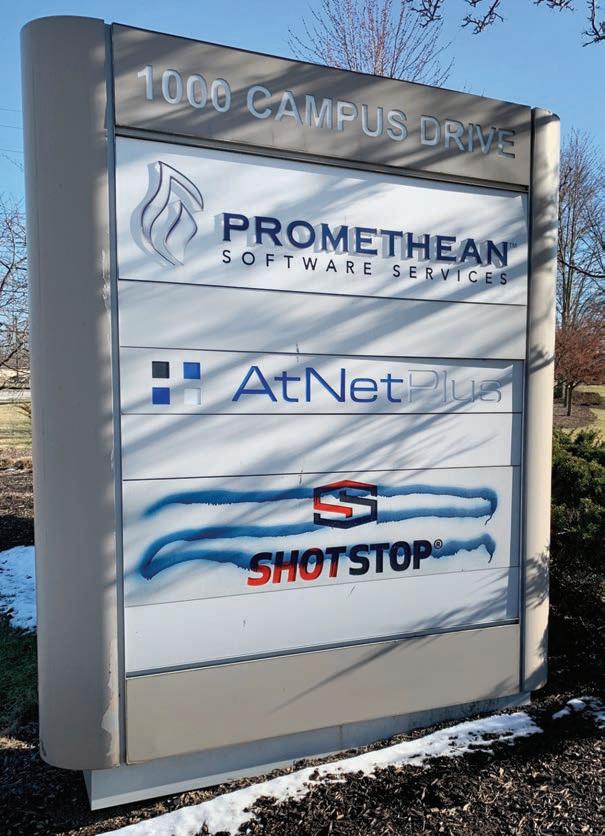
cess for determining that value is dictated in the related operating agreement that ShotStop did not follow. ShotStop disagrees with this.
Serra said ShotStop e ectively claimed that the shares for each of the named plainti s in the M&M suit were worth somewhere between $70,000 to $75,000, “but we have evidence indicating they were worth approximately ve- to seven-times more than that.”
is dispute predicated a second M&M suit led in July 2022, which the court has since combined with the original M&M suit.
e purpose of M&M’s initial suit was to force ShotStop to allow investors access to the information they wanted. e second suit centers on a dispute over how the value of plainti s’ shares was derived.
sought additional information, including details on outside third-party investors, management e orts, purchase orders, raw material vendors and customer or potential customer information.
e company also said in its counterclaim that at “all times relevant” the business had just eight full-time workers, noting that because of the “very small number of employees, ShotStop employees are often times performing di erent duties to meet the ordinary demands of operations of ShotStop.”
“ e stated reasons of Counterclaim Defendants’ request for access to ShotStop’s company o ce and the requested documents from ShotStop was a ‘pretext’ and a veiled attempt to continue the disruption to the normal business operations started by Mr. Serra; and thus, did not constitute a proper purpose,” ShotStop argues, according to court lings.
Further, according to the company’s counterclaims, Serra during a visit to the business in 2021 “insulted the professional who is responsible” for ShotStop’s patents and “claimed that ShotStop should pay Mr. Serra a large sum of money to perform current and future professional work relative to” the company’s patents.
“ is resulted in the manager and Mr. Serra getting into a heated argument and Mr. Serra’s ejection from ShotStop’s o ces,” according to court documents.
Serra said that the story is a “complete fabrication.”
He said the visit he made that these claims seemingly stem from was cordial and included Iliev giving him a tour of the ShotStop facility and samples of a ballistic board product. He asserts that they shook hands and amicably parted ways at the time.
As the M&M case proceeded and allegations of Serra’s disruptive behavior were made, Serra said he asked for copies of recordings from security cameras at the ShotStop facility that have never been produced.
Serra emphasizes this as he describes the allegations of him personally causing a disturbance as not just false but “comical.”
Meanwhile, counterclaims by ShotStop in the M&M case accuse Serra and the parties that brought these lawsuits of disrupting its business operations.
According to court documents, ShotStop contends that it provides 24-hour access to company information—including business updates, product development, trade show updates, nancials, certi cations, business processes and marketing information— through a “Trello Board” internet platform.
Despite this, the company states that it furnished bank records and tax returns for the years 2018, 2019 and 2020 to the investors seeking information.
But according to details of the lawsuit, the suing investors
Iliev did not respond to requests for comment about the lawsuits.
As of February 2024, Iliev and ShotStop are being represented in the News Ventures and M&M cases by Zachary Durant of Reminger Co. LPA, according to court lings.
Durant did not respond to requests for comment.
In an email to investors following a federal raid of the business last fall, Iliev said the company has had “informal discussions” with third parties about the sale or licensing of ShotStop’s ballistic board intellectual property, though those had not yet resulted in any material offers.
In the same message, Iliev noted that bankruptcy “continues to be a viable consideration and option for ShotStop in the future.”
Accelerator is expected to feature two cohorts per year with 10 startups each
By Jeremy NobileA new accelerator program launched by Cleveland’s JumpStart Inc. could be a catalyst for growing the region’s medical technology and software companies.
Backed initially by a mix of federal funds and contributions from JumpStart supporters, the Trailblazer HealthTech Accelerator is expected to feature two cohorts per year with 10 startups each at seed or pre-seed stages of development.
Each accelerator will last three months. By the end, the goal is that each participating startup will have a solid business plan and be better equipped to lobby for venture capital.
e program’s rst o cial cohort, which will run between April 15 and July 15, is already being assembled—the application window for that closed on March 15.
A fall cohort will follow and the expectation is for that twice-ayear dynamic to be repeated going forward.
JumpStart says that support provided to accelerator participants will include one-on-one advising, access to a bevy of subject-matter experts and up to $125,000 in non-dilutive funding for eligible critical services to fasttrack a startup from concept to commercialization.
While this targeted accelerator is a rst for the 21-year-old organization, Kaleigh Gallagher, JumpStart’s vice president of tech services and network management, frames the initiative as building upon the services the nonpro t was formed to provide to the region’s startup ecosystem.
“ is is the rst time that we are taking all our expertise, packaging it into an intensive three-month program, selecting companies at pre-seed and seed stages, helping them work through early challenges and looking at companies from 360 degrees to make sure they have a solid commercial plan and are ready to talk to investors,” Gallagher said.
As far as the focus on the socalled health-tech sector, that’s largely a function of the region in which JumpStart operates.
“If you look at the companies that JumpStart has historically served, nearly 50% of them have been in the health-tech space,” Gallagher said. “We have a history of being able to support those companies coupled with the fact that Ohio—and particularly Cleveland—is just renowned for access to health care experts. is is very much a hotbed for health care innovation.”
Program piloted in 2023
Tosan Ugbeye, CEO and founder of ScopeMed—a 2021founded pre-revenue startup
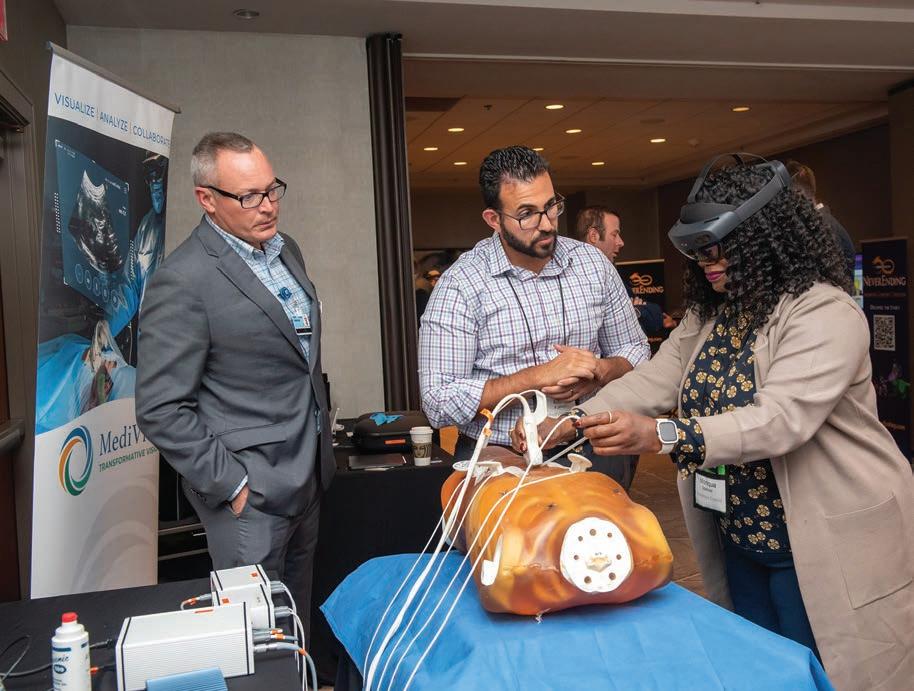
that has developed a high- ow oxygen therapy and modular, multi-functional oxygen mask— participated in a pilot program for this accelerator last fall.
Ugbeye is a certi ed anesthetist who came up with his idea while working in hospitals during the COVID outbreak. His ultimate goal is to build a portfolio of respiratory products that help people breathe better whether they’re grappling with diseases or disorders or just being treated in clinical settings.
Ugbeye was approached by a JumpStart o cial who encouraged him to try the program because it might be bene cial.
“And boy were they right,” Ugbeye said. “I think we came out of the program way more prepared as a company. It was kind of this cohesive, holistic approach to the medtech space based on all the expertise (JumpStart) has built up.”
Compared to other accelerator programs out there, JumpStart’s may stand out because of its vast network of experts who can provide guidance and direction.
Ugbeye certainly thinks so.
“I think for a lot of founders like myself who are clinicians, there needs to be this kind of debriefing process,” Ugbeye said. “You need that sort of ‘Men in Black’ moment where they make a ash and you forget about the language of clinicians and learn to speak the language of stakeholders.”
“Us founders—especially when you’re in the eld where you have this domain knowledge—you tend to be all product-focused,” he added. “But how are you going to communicate this? Why should they care? How do you explain the bene ts? How best can you obtain relevant clinical data to show that your product works? ( e program) helps build us up
“For any startup entrepreneur, having access to people who can share their wisdom and their networks to assist you in shaping and launching a business is invaluable.”
Baiju Shah, president and CEO of the Greater Cleveland Partnership
for this.”
Ugbeye, who said he would recommend the program to others, is preparing to put what he has learned to use as he gears up to raise some seed funding.
“We are bringing service providers and experts to the table that these companies get exposed to during the curriculum, but they’re also getting knowledge that can go much deeper on particular business problems that they are trying to solve or nd answers to,” Gallagher said. “It’s very intensive but can be customized for what works for them. And they’ll get access to experts and service providers that they probably would not be able to work with if trying to access them on their own, given the stages of these companies.”
Helping fuel this program in part is a $2 million grant JumpStart received from the U.S. Economic Development Administration, plus a $2 million match provided by agency partners, including Case Western Reserve University and UH Ventures. With currently available resources, JumpStart is committed to running the accelerator for at least three years.
However, Gallagher said the goal is to make this a recurring, sustainable program—which is naturally contingent on securing the nancial resources to keep it going.
tively moving here, Gallagher said.
Applications for the rst cohort had been open for only a few weeks, and Gallagher said there’s been interest from out-of-market startups as far as Texas.
Whether bringing startups here or backing those already in the market, Baiju Shah, president and CEO of the Greater Cleveland Partnership, stressed that the need to have more resources to support emerging entrepreneurs in this region can’t be understated.
To that end, the JumpStart accelerator is a promising step in the right direction.
“New entrepreneurs in the healthtech space can bene t from the types of access to seasoned entrepreneurs or industry experts that they have assembled to not only sharpen their business plans but also make connections that they may need as they are starting their business in order to get to greater levels of probability of success,” Shah said.
“For any startup entrepreneur, having access to people who can share their wisdom and their networks to assist you in shaping and launching a business is invaluable,” he added. “My hope is this accelerator platform like JumpStart’s becomes that connecting hub point where entrepreneurs can connect with other expert entrepreneurs and leaders that help them build successful businesses in our region.”
While JumpStart does invest directly in some companies through its JumpStart Ventures arm, it’s important to note that there is no promise of the organization investing in any startups that go through the accelerator. Nonetheless, this program will funnel some potential investment opportunities to the agency.
Eligible participants in the accelerator must be based in Ohio or ac-
Gallagher emphasizes that— besides nancial support—the organization will rely on participation and feedback from the region’s entrepreneurial ecosystem to grow its network of subject-matter experts, mentors, service providers and the like.
ose interested in connecting with JumpStart to explore opportunities to support its accelerator in particular are encouraged to contact Gallagher at Kaleigh.Gallagher@jumpstartinc.org.









Jordan Katz has seen the light. It was too bright for anyone to look at, but he says it lit the way to a new niche for his company, Gra x Plastics in Maple Heights.
e light Katz saw came in 2017, with that year’s eclipse. He realized that while people need special glasses to view the eclipse, they also need something to use with their phones. Such a device would ensure the phone camera’s sensors aren’t damaged by the bright light and, more importantly, a user can actually get good images of what for many people is a once-in-alifetime event.
Out of that, Gra x’s new product, SafeShot, was born.
e SafeShot isn’t a complicated device, aside from the making of the lm, which Gra x has done with a custom extruder using its new formula. It’s literally a plate made from a piece of sturdy cardboard, with a sticky spot that holds it to any phone with a at back, a piece of dark lm that covers the phone’s camera lenses and acts as a lter, and another window of dark lm for the person to look through directly.
quired formulating a speci c lm that would appear opaque, but would actually let in enough light from a very bright source like the sun for it to be photographed. It also had to achieve ISO certi cation standards for eye protection.
“We had our nal formulation that passed all the certi cations in late 2022,” he said.
en came the Eureka moment. As Katz and his team watched folks observing the 2017 eclipse (and others that have occurred since then), they noticed something nearly everyone had in common.
“We were working on the film and the testing and there was all this media coverage of the eclipse. We saw all these pictures of people trying to take photos of the eclipse with their phones.”
Grafix has the devices listed on Amazon, Walmart, and the Great American Eclipse website, where it already has sold tens of thousands of them for about $16 each, or $56 for a pack of four.
ey’re going to put them in 350 stores” this week.
On top of that, Katz said he’s selling his new lm to others, including many who are using them to make traditional eclipseviewing glasses.
Together, those sales will denitely move the needle at Gra x, which Katz said has annual sales of between $7 million and $10 million in a normal year.
“It’ll have a big impact on our sales this year for sure,” Katz said.
But this boom won’t last forever — and has a very de ned end during the late afternoon of April 8.
“It’s a game of musical chairs, but we all know exactly when the music will stop,” he said.
But, he notes, that doesn’t mean people won’t play again. Katz and his team are now eclipse experts with regard to where and when the moon’s shadow will pass over the earth next. ey plan to sell more lm for each event, even if none of them are as big as the total solar eclipse about to transverse the U.S., including Northeast Ohio, in April.


But, more importantly, is that protection for both eyes and phone sensors from damage that might otherwise occur.
Katz said the 2017 eclipse presented an opportunity for his company, which works with plastic lms, to create a special lm it could use for eclipse-viewing glasses.
at’s no small feat, it turns out. To do it right, Katz said, re-
“We’ve already shipped about 30,000 and we’re working on another 70,000 as we speak,” Katz said. “We should hit around 200,000 plates when this is all said and done.”
Online sales are good, as he expected, and Katz said he’s about to get SafeShot on some local store shelves as well.
“It’s doing well on Amazon, on Walmart. We’re picking up last minute customers too,” he said. “We’re crunching to get a big shipment out to Meijer’s now.





“ ere are a couple of eclipses coming in Iceland and in the Northern UK … then Egypt and then Australia,” he said. “We are thinking of the future.”
So, if you’re able to see the eclipse and get a good photo of it with your phone, you might want to thank Jordan Katz.
And if you’re able to see and take photos of anything the next day, you might want to thank him again.
Don’t have the proper equipment? Don’t watch.
at’s the message health experts want to get across ahead of the 2024 total solar eclipse. With Cleveland in the path of totality, plenty of eyes will be on the sky, but this once-in-a-lifetime event could lead to irreversible vision loss if viewers don’t use the right equipment.
“You might not realize there’s damage happening,” said Dr. Aleksandra Rachitskaya, a retina specialist at Cleveland Clinic’s Cole Eye Institute. “It doesn’t hurt, and the vision changes don’t happen right away.”
What happens if I watch the eclipse without eye protection?
Looking directly at an eclipse without proper glasses or viewers puts you at risk for solar retinopathy, or damage to the retina caused by extreme light exposure, in only a matter of seconds.
“ ere’s no amount of time that’s safe to look at the eclipse without solar lters,” Rachitskaya said.
Mild cases of solar retinopathy can sometimes improve, but there is no established treatment for the condition, Rachitskaya said, and severe cases cannot be corrected with eyeglasses or intervention.
Where should I buy eclipse glasses? If you’re still on the hunt for safe viewing supplies, Rachitskaya recommends consulting the American Astronomical Society’s website, which has a list of reputable suppliers of eclipse glasses, solar viewers and solar lters. And if you’re planning to use binoculars, a telescope or a camera, you need a solar lter for that equipment, too.
“Just having the solar lters in your glasses that you’re using or the viewers that you’re using is not su cient,” Rachitskaya said. “You can still be at risk of solar retinopathy.”
Before using your solar lter, you should inspect it for scratches or damages, according to the American Astronomical Society. If you notice any issues, discard it. If you normally wear eyeglasses, keep them on and put your eclipse glass over them. Do not remove your glasses while looking at the sun.
Rachitskaya said it’s important to keep a close eye on children using solar lters.
What if I don’t have eclipse glasses?
If you don’t have the proper equipment for viewing the eclipse, you can view the partially eclipsed sun indirectly through a pinhole projection, according to the American Astronomical Society.
With your back to the sun, cross your slightly open ngers of one hand over the other to create a wa e pattern. e spaces between your ngers will make a grid on the ground that shows the sun as a crescent during partial phases of an eclipse.






















Between the total solar eclipse and the Guardians’ home opener, Monday, April 8, gures to see a lot of people swarming downtown. But what will the throngs of humanity look like?
O cials from Cleveland and surrounding suburbs expect Eclipse Day to feel like a crowded St. Patrick’s Day or well-attended Fourth of July celebration.
However it turns out, Cuyahoga County’s emergency manager is ready for anything — even 2016 Cavs victory parade-size crowds.
Destination Cleveland estimates that about 200,000 people will visit Cuyahoga County on the day of the solar eclipse. at number could be compounded by fans staying in the city after the NCAA women’s basketball championship game and arriving for the Cleveland Guardians home opener but the city is not planning for a law enforcement presence like that during the 2016 Republican National Convention.
“We don’t want to create undue anxiety. We just want people to, just to be aware this is coming and because of that they may need to make the adjustments that day,” said Mark Christie, emergency manager for Cuyahoga County.
“As far as the safety around viewing the event, what makes us unique from other areas is that we’re a pretty massive county, and we have a big health care presence with big hospitals. We also have NASA and the Great Lake Science Center and they’re all keenly aware this is coming,” he added.
e eclipse is deemed a largescale event, which triggers an allhands-on-deck law enforcement presence and the creation of an emergency operations center (EOC).
“We will have an emergency operation center and will have certain partners we want to be in that room and be ready to react, coordinate and provide resources,” Christie said.
Cleveland has a lot of experience hosting large events. But while the city is familiar with the preparation that goes into something as big as the Eclipse-Gaurdians combo, Cuyahoga County emergency management o cials are busy meeting with smaller suburbs to help them prepare for a Cavs Championship parade-like crowd within their borders.
“ e state of Ohio has been preparing for the solar eclipse totality for about two years, trying to ensure residents the counties are
aware of the event and make preparations accordingly,” explains Christie.
“At the county, we really got underway about a year ago,” Christie added. “We are always focused on preparing for large special events or events that can turn into emergencies but this one certainly has a unique set of circumstances.”
e solar eclipse path makes April 8 a countywide happening. Emergency Management Service (EMS) manager Christie and sta are meeting jointly with most, if not all, of the county’s mayors, safety forces, service departments, utilities, health care facilities and schools.
e County’s EMS o ce is charged with the mundane but critical planning before large events and sta spend most of their time and resources making sure that all the di erent audiences and stakeholders are communicating and sharing information.
Preventing “an emergency” situation can come down to helping cities acquire things as mundane as Jersey barriers, message boards and porta potties for large crowds.
Christie’s o ce acts similar to an event planner helping with resources for communities hosting watch parties or adjacent to watch parties by advising on road closures or helping procure road barricades and sign boards.
“ is total solar eclipse is going to be a party. ere are going to be watch parties, festivals, rooftop parties, music events,” Cuyahoga County Executive Chris Ronayne told a group at the Natural History Museum event where he handed out eclipse safety glasses to Barton Elementary students. “ ank you for being ready, for being prepared, because we also want to make that day safe,” Ronayne said.
e great unknown for a large event like the one expected in downtown Cleveland is what the addition of thousands of people does to tra c and, if there are slowdowns or stoppages, how long those will last.
“We’ve consulted with Nashville, which experienced a total eclipse in 2017, to kind of get their experience and they mentioned tra c issues, because of course generally everyone is trying to leave at the same time,” Christie said.
Cleveland is a large urban area with a big transportation infrastructure that is designed to move a lot of people in and out of the city — but a bottleneck is still a bottleneck.
In addition to tra c congestion,

look for surge pricing in parking, downtown and anywhere events are planned.
According to a parking reservation feature at LAZ parking, which owns a number of lots in and around downtown, a stay from 10 a.m. to 9 p.m. will cost $44 at Tower City. Reservable parking spots that day on West Ninth Street are still showing the normal weekday rates — for now.
With the digital parking rate system, owners can change those rates with a quick system prompt.
ABM’s Hamilton Garage on East 12th Street, deep in the eclipse watch territory, is not planning on charging more for parking April 8.
A spokesperson for the company told Crain’s there are no plans to up the $5 parking fee in the three- oor garage at least during the eclipse before the Guardians game. “We are not planning any special event parking,” she said. “It is just a regular day for us. We don’t think people are really going to come downtown for the eclipse.”
Cleveland spokeswoman Marie Zickenfoose told Crain’s that the city’s Muni Lot and city-owned garages will be set up for “special event parking” which also comes with the possibility of higher surge pricing.
“ e lots and garages are open at 5 a.m. and rates will be determined as we get closer to the event,” Zickenfoose said.
Street parking will be limited to ensure “unobstructed lanes for maximum mobility,” she said. A joint Cuyahoga County and City of Cleveland press conference is planned for mid-March to go over speci cs with the media.
As for tra c across the entire state, Gov. Mike DeWine signed an executive order Wednesday, March 13, to assure the state it’s well-prepared for April 8. e order “directs all state departments and agencies to be ready and prepared to ensure the health and safety of all Ohioans and visitors before, during, and after the eclipse.”
It also orders the State Department of Transportation to be fully sta ed to assist with tra c control and treat the solar eclipse like a major travel holiday, including restricting and reducing active work zones to accommodate the extra tra c.
Additionally, the turnpike will operate as if April 8 is a peak travel day and be sta ed by personnel providing roadside assistance all day while toll booths and service plazas will be sta ed in anticipation of a high-volume tra c event.
Finally, the order prohibits stopping on the side of roads or exit ramps for non-emergencies warning drivers to “not attempt to view or capture the eclipse while driving.”
One of the most unique parts of the region is the Emerald Necklace of the Metroparks. And with about 100 educators working at the different nature centers, talking about what it means to be in a path of totality, the organization is a prime location for watch parties and eclipse chasers.
With that said, there are no ocial scheduled events and no camping on the Metroparks properties, said Brian Zimmerman, CEO of Metroparks.
“For us, it’s considered a heavy day,” Zimmerman said. “A heavy day is like what we see at Edgewater Live in the summer. We are not programming anything because we don’t know how many people will come and we don’t have any reservable space that day. It is literally on a rst-come, rst-serve basis.”
Metroparks rangers will be out April 8 and Zimmerman cautions visitors to be patient and plan for tra c, full parking lots and a long day.
Zimmerman said visitors should anticipate Fourth of Julylike levels of activities starting early in the day along the lakefront at Huntington Beach or anywhere near Avon Lake, which is the complete path of totality.
“ e best thing we can say is pack snacks, pack water, be prepared and be prepared for some tra c,” Zimmerman said. Mayor Ethan Spencer of the Village of Moreland Hills is working with Metroparks law enforcement to help with the small event in his city’s pavilion across from the Metroparks’ polo elds.
“Our community is very small and it’s more spread out. Right now we have less than 200 people RSVP’d and we had 150 roughly the last time I looked. Our Police
chief has asked all of our police to be available. No one will be taking vacation that day,” Spencer said. “We don’t really know what to expect beyond that. Because we’re typically not a destination community. But you’re hearing that people are de nitely interested in being in your city and watching.”
Michael Brennan, mayor of University Heights, is looking to o er his residents an opportunity to stay relatively close to home during the solar eclipse.
“We’re having an event at our community park, Walter Stinson Community Park. We wanted to encourage people to stay closer to home so that they’re not hitting the road when hundreds of thousands of people could be traveling in,” Brennan said.
e University Heights event comes with a DJ and a co ee truck. Plus, the city will provide 10,000 pairs of protective eyewear — equivalent to two pairs for every household — for safety.
‘Pretty interesting experience’
In the end, it’s all a lot of planning and security for what, according to Cleveland Natural History Museum astronomer Destiny omas, is a mid-day event that will last about two hours and 30 minutes.
e rst stage of the eclipse will begin around 2 p.m. and totality — 100% coverage of the sun by the moon — will occur around 3:15 p.m., omas said.
“You may hear nocturnal animals becoming more active, crickets chirping, coyote tolling. You might hear diurnal animals, the ones active during the day, going quiet. It’s going to be a pretty interesting experience, not just for us humans, but also for other living things,” omas told the group of CMSD students at the museum.
Finally, besides it not being a good idea to try to capture the solar eclipse on your smartphone due to the volume of people concentrated in certain areas for watch parties, there is also the real chance for widespread cell phone issues.
Be prepared to have slow or no service and take it as a sign to put the phone down, put on the safety glasses and be in the moment.
e upcoming total solar eclipse is a major astrological event, one Northeast Ohio won’t see again until 2099. But, if history teaches us anything, you might want to have a viewing backup plan.
If you’ve lived in Northeast Ohio long, you know we experience so much cloud cover, we give Seattle a run for its money when it comes to dreary skies. And that could put a damper on eclipse viewing on April 8.
e National Oceanic and Atmospheric Administration (NOAA) and North Carolina Institute for Climate Studies (NCICS) have mapped out the likelihood of “viewability” for Eclipse Day at U.S. locations along the path of the totality.
It’s not that bad, but Cleveland is still near the bottom of a shaded heap with a 38.9% chance of viewability on the big day, according to the scientists who put the stats into the national map. ree other regional cities — Rochester, Bu alo and Indianapolis — fair only a bit worse with chances of viewability in those cities is 37% or less.
But, as NOAA meteorologist and public a airs o cer John Bateman pointed out in an email, we won’t get reliable forecasts until about a week before the big event.
“I contacted our colleagues at NOAA NWS (National Weather Service) and they said that forecasting the actual cloud cover for the Cleveland area for the eclipse on April 8 would be something they’d start looking at about seven days ahead of the eclipse,” Bateman said in the email.
So, Cleveland and its expected guests are just going to have to hope for the best — or have a good alternate plan.
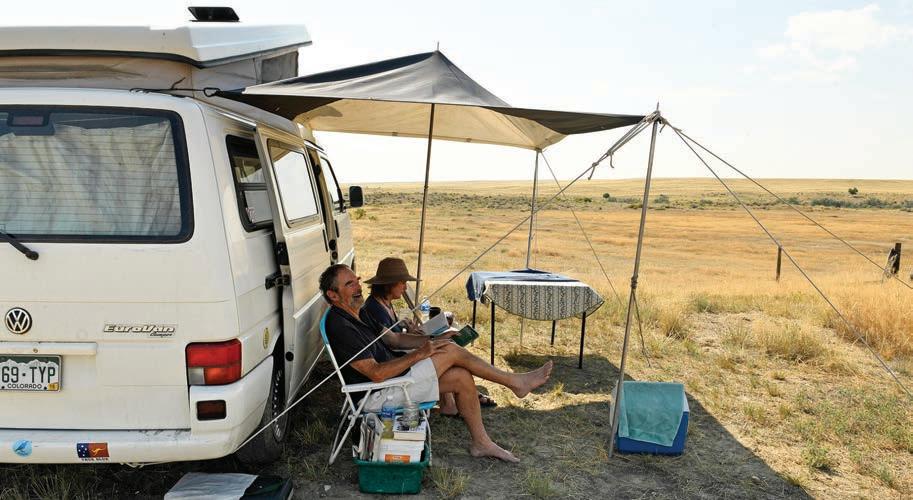
And that’s where Jon Gray comes in.
It could be a hassle for some involved in the eclipse trade if folks change their plans at the last minute based on a weather forecast.
ere could be a rash of cancellations at local hotels, Airbnbs and restaurants. Or, less likely but still possible, we could nd ourselves looking at clear skies while other areas see storms, resulting in a ood of last-minute requests for lodging and food.
At least one local company, though, is already is reaping rewards from the uncertainty.
“We’re seeing a pretty signi cant amount of bookings coming in from it so far. Usually, we see bookings jump during Memorial Day. But so far, our bookings for the eclipse are eight times what they are for Memorial Day,” said Gray, CEO of RVshare.
Founded in Akron, but now with


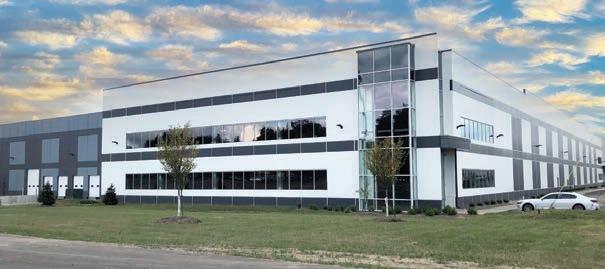
its executive o ces in Austin, Texas, where Gray is based, RVshare is sort of an Airbnb on wheels. Owners of the vehicles rent them out to folks who want one for a week or a month.
Gray’s customers for April 8 have gured out that an RV gives them the best chances of having good viewing conditions for the eclipse. If it looks like it will be cloudy where they’re heading for April 8, they can just drive someplace else.
RVshare doesn’t divulge its booking numbers, but Gray said they’re already up 2,200% in Texas, 2,000% in Arkansas and 1,000% in Ohio for the big event.
“It’s not like ve bookings went to 50 either,” Gray said. “ ey’re pretty big numbers.”
As Gray’s numbers indicate, the eclipse will be a major travel event, something he and his team have been following.
Nearly 80% of people in the U.S. say they plan to view the event, and more than half of them will travel to do so, Gray said.
And there’s still yet another way to take your best shot at an unobstructed view of the celestial event: get above the clouds.
So far, there are no reports of local planes planning to go up for
that purpose, just planes coming here with people hoping to see the eclipse in Cleveland.
“We’ve taken plenty of calls from people wanting to come into see, it but I haven’t heard of anyone here ying to see it yet,” said Joel Woods, operations superintendent at Cleveland’s Burke Lakefront Airport.
If April 8 is cloudy, though, Woods won’t be surprised to see it happen. Burke will be open for business as usual, and even a small turboprop plane can y high enough to get above most cloud cover, he said.
Or, you could y from Austin to Detroit on the day of the eclipse.
at’s the point of Delta Flight 1218, which the airline announced will y as close to the line of the eclipse as possible in order to give passengers the maximum amount of eclipse-viewing time.
It’s also the point of Delta’s Flight 1010, which the airline added after the special Flight 1218 immediately sold out.
Chances are good that, by the time you’re reading this, that one is sold out, too.
“Following the Monday, Feb. 19, announcement of the rst path-of-totality ight, searches for ights from AUS-DTW on Delta channels spiked by more than 1,500%,” the airline reported.
On the bright side, this year’s weather has been anything but normal so far, so maybe we’ll have just as good a view from Cleveland as the folks will at 30,000 feet.
And we know the food is better.







Lachelle Bender is used to breaking new ground.
In 2005 when she opened Gimmeahand Academy of Nails, a nails-only beauty school in Cleveland, it was the rst of its kind in Ohio — and the nation — she said.
Today, there are numerous similar schools around the country with more on the way. Bender knows because many of them turn to her for advice and information about products she has formulated for her business.
“And these are schools that are all owned by Black women,” Bender said.
But while Bender intends to stay in the business of training others to be nail technicians, she’s not satis ed with the way things are.
Besides her current success, Bender says she wants to be a manufacturer — and she’s about to become one.
“We’re looking for a manufacturing facility now. at’s what I’ve been doing for the last 10 months,” Bender said.
Bender said she’s looking for about 25,000 square feet of space in town.
“About 20,000 (square feet) will be for manufacturing and 5,000 for the school,” she said. “I want to house the manufacturing and the school in the same building.”
Bender won’t be the rst Clevelander to go into manufacturing in Cleveland, of course. But she’ll be one of the rare Black women to become an owner in a eld dominated by white males.
Bender said the people she has met in manufacturing have welcomed her and given their time and expertise to help her formulate a plan for her new business. That ranges from the financing to how it will operate and manage the processes required to make the oils, soaps and polishes she plans to produce and sell to other schools.
ere were two things that helped Bender succeed: e orts made by others, including the workforce and manufacturing support agency, Manufacturing Works in Cleveland. She attended the organization’s Leadership Institute in 2021 and made connections that still help her today.
e second is that Bender sought out and embraced that help wherever she could nd

it. She has been through the Goldman Sachs 10,000 Small Businesses accelerator program and has worked with the Cleveland organization Women in Manufacturing while touring big operations such as Sherwin-Williams.
“ e information I’ve gotten is invaluable. I don’t make enough money to pay for the knowledge I get from these groups,” she said.
Bender also is part of a larger trend: people of color making big inroads into a sector of the economy where many say they’ve been underrepresented for too long.
Ethan Karp, CEO of the manufacturing advocacy and support agency Magnet in Cleveland, said his organization has seen progress through its periodic survey of members.
“In our survey, we asked back in ’21 and again in ’23: ’How many managers do you have?’ and then we asked ‘How many were people of color?’ and then calculated the percent increase relative to the totals. What we saw was an 80% increase in people of color in management positions (between the two surveys),” Karp said. “And we also added more than 2000 people of color to the (manufacturing) workforce generally.”
What’s going on?
“I attribute it to three things. For one, there’s recognition that retention is a top priority and that the best approach is to have
leaders who look like your employees,” Karp said. “Two, there’s a tight labor market. ... And three, there is a sucking from the top where you have people retiring, and that’s enabling more upward mobility right now.”
Karp said companies are embracing diversity in hiring because it’s enabling them to grow at a time when workers are hard to nd. ey tend to nd that the strategy works and want to repeat it, he said.
“ ere are real business reasons to do this and that’s going to be the best motivator for pro t-oriented companies any day,” Karp said. “Diversity is the best thing for our companies. When you can’t nd people to ll any role, you can’t leave talent on the table.”
Other organizations echo Karp’s sentiments while working with both manufacturers and potential employees.
“We have targeted recruitment,” said Brianna Schultz, vice president of learning and development for Manufacturing Works, where she oversees the Leadership Institute. “We strongly encourage women and people of color to apply. We have a goal of having 50% of cohorts being either women or people of color and we’ve done a pretty good job of that. Some (cohorts) are a little less, but some are a little more.”
Part of the challenge is getting a more diverse worker pool to consider manufacturing as a career choice. After decades of not always feeling welcomed in the
sector, many have turned away after seeing relatives have bad experiences and because of the industry’s former reputation as dirty and sometimes dangerous.
But as manufacturers have cleaned up their shops and improved their conditions, and as the nation has begun to value manufacturing again in light of recent global supply-chain issues, conditions are improving and recruitment may be getting easier.
“We’ve partnered with the Presidents’ Council, which is the Black Chamber of Commerce in Cleveland, and the Urban League of Greater Cleveland and we’ve seen more interest from those channels than in the past,” Schultz said. “I feel like recruitment has been easier than it was in the past.”
But there is still more that could be done by employers that want to tap this underused — and often overlooked — talent pool and potential candidates who want to prepare for new jobs, say groups such as the Urban League.
Zach Stover is an employment relationship specialist at the Akron Urban League, where he helps job candidates prepare resumes, practice interviewing and hone the soft skills necessary for almost any job, including in manufacturing. He also works with about 40 local employers and a couple of temp
agencies that hire some of those job seekers.
Many of the candidates Stover works with face challenges, either in getting a job or in getting to a job. ey might facet the stigma of having a criminal record or face transportation and scheduling di culties as they juggle other duties, such as childcare or school, with their jobs.
Manufacturers have become more exible with applicants, including programs for former inmates, but there are still improvements to be made, said Stover, who also places workers in other jobs and industries.
“In the manufacturing eld, we’re de nitely helping people nd the best opportunities,” Stover said. “But I’m trying to get them (employers) to be more open-minded when it comes to some things, like shifts.”
For example, he noted, a single parent might need more exible hours to manage child care.
Some employers say they want to hire a more diverse mix of employees but don’t realize or accept that it will require more e ort.
“I have companies that reach out and say, ‘I’d love to make our workforce more diverse’ and I say, ‘Fine, let’s talk about it.’ But often, when I bring up barriers in the community, they’re not willing to work with them,” Stover said.
Transportation is a big issue, he said, because many people just starting out in their working lives don’t have the money for a car. And, unlike in decades past when most manufacturers were located in the city, often close to downtown and very often close to where employees live, today’s manufacturers tend to be spread out across the suburbs and even further a eld in rural areas.
But, overall, Stover said he has seen things improve, especially at companies that he’s worked with that have successfully hired and promoted minorities within their ranks. Success begets success, he said.
And when there are challenges, there are more people like him, Schultz and the team at Magnet to work with both employers and employees to overcome them and ensure that some positive recent trends continue.
“It’s all about building relationships,” Stover said. “ ere might be hiccups, there might be soft skill issues. ... We’re here to help with that.”
Hunter Taylor had an idea — one that would help solve a proverbial problem that hit home for him when he got engaged. e idea was to build a wedding band that was durable and exible enough to t over even the chunkiest of knuckles, like his own.
Taylor is an engineer — but not necessarily a businessman. He needed help turning his idea into a product and, eventually, an enterprise.
He found his answer at the EVOLVE Technology program in Youngstown.
EVOLVE is one of the business development programs available through the Youngstown Business Incubator, focusing on tech-based startups, including so ware and advanced manufacturing. YBI shi ed from a general purpose in the 1990s to a tech focus in the 2000s. Today, the incubator has ve buildings in downtown Youngstown, works with technology startups, and has added additional programming for small businesses and youth entrepreneurs.
“We’re here to help,” says EVOLVE Director Chandler Fi ck. “I’d love to see more startups here in Northeast Ohio.”
Embracing ‘the idea stage’
Taylor is the founder and CEO of Tailored Alloys, a company that develops high-strength, hightemperature alloys for use in biotechnology, nuclear power, and aviation, among other elds.
Tailored Alloys includes a line of what Taylor appropriately calls Tailored Rings. ese patent-pending rings are made of cobalt chrome, hinged, and 3-D printed in one piece. “Research is a long path to pro t,” Taylor says. “We needed a product.”
Taylor, who’d won an NSF Award for his research, said he wanted to make a durable, form- tting, and safe ring. Gold was durable but not necessarily form- tting, and rubber was formtting and safe but not durable. He gured he’d built the proverbial better mousetrap, but the world didn’t beat the path to his door.
“As an engineer, I don’t know anything about running a business,” he says. “And there are a lot of things you really don’t know until you get to them.”
at’s where EVOLVE came in. It works with any tech-based startup, including So ware as a Service, additive and advanced manufacturing, and has a minimum viable product (MVP) development program for
qualifying portfolio companies.
Fi ck says EVOLVE is a “bespoke incubator” that tailors solutions for each applicant – and does so without seeking any equity in the company.
e EVOLVE Technology program relies on a team of entrepreneurs in residence to serve as mentors, advising start-ups at any stage of the game.
“It doesn’t have to be a clean slate,” Fi ck says, “but I like to work with companies at the idea stage.”
Helping startups prosper
Fi ck says sometimes companies invest in a product that might not be well-researched. Taylor learned his own limitations when it came to marketing and advertising. In college, he thought it was frivolous. Now, he has his own marketing and advertising budget.
“EVOLVE really reduces your time going down the wrong rabbit hole,” he says. “ eir knowledge is invaluable.”
Taylor lives in Georgia, but he has a manufacturing space in downtown Youngstown, employing six people in a building that was formerly home to the city’s newspaper. He corresponds regularly with EVOLVE and tries to get into town about one week a month (he’s particularly enamored of the

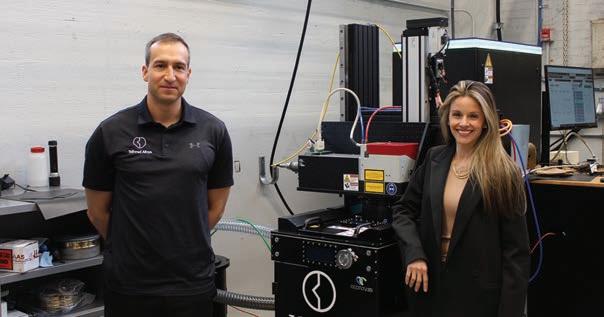
fried dough, an Italian dessert, at the locally renowned Avalon Downtown Pizzeria, not far from YBI).
Tailored Rings is currently a DBA for Tailored Alloys, but Taylor says he’s working with EVOLVE to develop a Kickstarter campaign on its second product line: thinner rings so couples can get matching wedding rings. e goal is for Tailored Rings to spin o into its own company in 2025.
He wants to expand — and EVOLVE wants him to prosper as well.
“ e goal is to have high-growth tech-based companies moving into Northeast Ohio,” Fi ck says. “It
doesn’t have to be just California and New York.”
Have a startup idea? Learn more about the EVOLVE Technology program and Youngstown Business Incubator at YBI.org.




K&D Group has named a team of three agents from CBRE’s Cleveland o ce to represent its downtown commercial space. It’s a switch from the Cushman & Wakeeld Cresco brokerage of Independence, which had the business for more than a year.
It’s a plum assignment: the regional apartment empire, headquartered in Willougby, has 10 downtown Cleveland properties in its portfolio, including Terminal Tower. Seven are former o ce buildings that have been converted into apartments, incorporating several million square feet of ofce and retail space.
e CBRE team is led by Warren Blazy III, a CBRE senior vice president, and includes Eric Smith and Vince Mingo, both CBRE senior associates. Blazy and Smith are ofce experts. Mingo handles retail space.
Doug Price, K&D CEO, said in a phone interview that K&D made the change as part of a standard practice of annually reviewing its vendor relationships.
“We feel (CBRE) has the resources that will move us forward in the future,” Price said. “ ey represent a lot of our tenants. ey have the (o ce) tenant rep side of their business and a retail group that totals some 30 people locally. ings have also stabilized there
since we moved it to Cresco. Warren Blazy is also really bullish on downtown and the company has local and national connections.”
Cushman & Wake eld Cresco gained the K&D assignment after Conor Coakley joined Cresco as a senior vice president from CBRE in 2022. He had previously handled the K&D work for CBRE, dating back to 2018. at’s when K&D rst named an exclusive outside agent after having tried multiple brokerages for outside listings as well as a former in-house commercial leasing e ort.
In a phone interview, Blazy said, “We’re really happy to be part of the next chapter for K&D. K&D is really focused on the future. And assignments in downtown Cleveland don’t get more iconic than Terminal Tower. What they have done downtown has been incredible. We just want to tell that story a little more. ere is something to being downtown that will help companies bring people back to the o ce.”
He noted that professional service rms, the backbone of much o ce leasing, are seeking something di erent as they look to bring workers back to the o ce from its outsized gains during and after the pandemic.
“It won’t be a group of tenants from here or there but rms that want features for their employees and a cool environment,” Blazy

said. He also noted that K&D’s portfolio has a variety of spaces available, from a full 88,000square-foot oor at Post O ce Plaza to 1,200 square feet at the Residences at Leader.
Blazy lives downtown and has focused on Cleveland leasing throughout his career. He moved
to CBRE last year after 18 years at national brokerage competitor JLL Inc.’s Cleveland o ce.
Andrew Coleman, CBRE’s Cleveland-Akron market leader, said in a phone interview that it’s exciting for CBRE to get the listing.
“ ere’s a tremendous inventory of space there,” Coleman said of
K&D. “ ey’re local and wellcapitalized. ey’re in a great position to compete and win deals in this environment.”
Coleman added that the Blazy team’s marketing pieces hit on two ideas, the long Cleveland history represented by K&D’s buildings as well as opportunities to participate in the city’s future.
Blazy is active with multiple downtown Cleveland and area philanthropic groups. He also brings the perspective of a new small business owner to the leasing fray. He owns the LIB (Life is Beautiful) studio, a yoga shop on the lower level of the Hoyt Block Building. He is not a yoga instructor, he said, but got into it because of his interest in “being part of the wellness community.”
For his part, Cresco’s Coakley responded to a Crain’s call about the change in the K&D assignment with an email.
“We’re very proud of what we accomplished with K&D over the past six-plus years, and especially last year,” Coakley wrote. “It was a pleasure working with them in landing high-quality tenants to their portfolio. K&D continues to do great things for Downtown. We wish them nothing but the best.”
In a telling move by K&D, it did not announce the change with a news release. Instead, Blazy announced landing the listing with a posting on Tuesday, March 5, on his LinkedIn page.
“We had a very successful o ce leasing year last year,” Price said. K&D added more than 100,000 square feet of o ce tenants while Coakley the listings during what brokers regarded as a weak downtown o ce leasing year.
“ is was a friendly move. We continue to have a lot of friends at Cresco,” Price said.
Akron and Cleveland are among 25 cities selected for Bloomberg American Sustainable Cities, a three-year initiative designed to “turbocharge” the cities’ e orts “to leverage historic levels of federal funding to proactively build low-carbon, resilient and economically thriving communities.”
Bloomberg Philanthropies on Tuesday, March 12, announced the $200 million e ort, which it described as a “commitment to support U.S. mayors taking on climate change.”
It said the initiative “will provide deep support to selected cities to pursue transformative solutions in the buildings and transportation sectors” through partnerships with PolicyLink, the Bloomberg Center for Public Innovation at Johns Hopkins University, and the Natural Resources Defense Council.
Ohio is well-represented in the initiative, with a total of ve cities, more than any other state. In addition to Akron and Cleveland, the Bloomberg American Sustainable Cities includes Cincinnati, Columbus and Dayton.
e other 20 cities are as follows: Atlanta; Birmingham, Alabama;
Bu alo, New York; Charlotte; Chattanooga, Tennessee; Hampton, Virginia; Jackson, Mississippi; Kansas City, Missouri; Lansing, Michigan; Memphis; Montgomery, Alabama; Nashville; Newport News, Virginia; Oakland, California; Philadelphia; Pittsburgh; Raleigh, North Carolina; Rochester, New York; Savannah, Georgia; and St. Louis.
Cities selected for the program receive a Bloomberg Philanthropies-funded innovation team (i-team) with “expertise in data analysis, insight development, human-centered design, systems thinking, and project management to bolster city capacity in driving progress on climate mitigation and promoting equitable outcomes.”
ey also receive “multi-year, in-depth, customized policy and technical assistance in collaboration with community-based organizations and local stakeholders to mobilize public, private, and philanthropic investments to achieve their goals,” Bloomberg Philanthropies said.
e nonpro t noted that work already has started in each of the 25 cities, “helping them incubate policies and projects while building local capacity through recruitment for i-team sta .”


Cleveland Mayor Justin M. Bibb said in a statement that Cleveland “has long embraced the responsibility of acting on climate change and environmental stewardship.
From former Mayor Carl B. Stokes’ historic e orts in 1969 to address environmental injustices, to our present-day climate action planning and implementation initia-
tives, our city stands as a testament to resilience and innovation,”
He added that the Bloomberg American Sustainable Cities program in Cleveland “will support equitable and more rapid implementation of historical funding at the neighborhood level, enhancing resources in our historically disadvantaged communities and
reducing the racial wealth gap.”
Akron Mayor Shammas Malik said in a statement that the Bloomberg Philanthropies-funded innovation team “will help us tackle real issues in the lives of Akronites — leveraging philanthropic funding to create and grow a truly sustainable and equitable Akron. With the added sta capacity and the network of other cities working towards similar solutions, we will be more innovative and engaged with the community in ideating, developing and executing projects that create local solutions to the problems facing not only our city but the entire world.”
e Bloomberg American Sustainable Cities program is designed to build on more than $400 billion in federal funding available to local governments through the Bipartisan Infrastructure Law and In ation Reduction Act.
Bloomberg Philanthropies has been active on local climate issues in the U.S. For instance, in 2019 it launched the American Cities Climate Challenge to help 25 cities “scale proven high-impact urban climate solutions in the buildings and transportation sectors.” e Ohio cities chosen for that program were Cincinnati and Columbus.
Two well-established Clevelandarea real estate companies plan to jointly develop an apartment building in Tremont that would wrap around e Tree House pub at the corner of Professor Street and College Avenue.
Dalad Group of Independence and Property Advisors Group of Beachwood are pursuing the plan for the four-story, 43-suite building with rst- oor retail space, hopefully for a restaurant, on the Professor side of the property. e structure, like the empty lots it will occupy, will be L-shaped, with its longest side north of Tree House on Professor and a stub of the building east of the pub on College Avenue.
phone interview. “We found our companies have good symmetry. We’re also partnering with them on an adaptive reuse project on Franklin (Boulevard.) We’re running this Tremont project, and they are running Franklin, because they have more experience with historic rehabilitation.”
e Franklin project, called Franklin Yards, is a 40-suite adaptive reuse of a former mansion and dormitory at 3105 Franklin. e building previously operated as an assisted-living center called Vantage Place.
Neil Viny, Dalad president, conrmed the Tremont joint ventures with Property Advisors in an email. He noted Property Advisors has a 20% stake in the Franklin project.
“We see this as a boutique property with an A-plus location in the center of Tremont.”
Brad Nosan, vice president of development and leasing for Property Advisors
Industry estimates would put the project cost at nearly $10 million. Northeast Ohio contractors and developers now use an estimated cost of $220,000 to $240,000 per suite as an estimate for constructing multifamily buildings.
Dalad and Property Advisors are 50% partners on the proposed building, according to Brad Nosan, vice president of development and leasing for the Nosan familyowned Property Advisors.
“We were talking generally about land, and they invited us to join them on this,” Nosan said in a
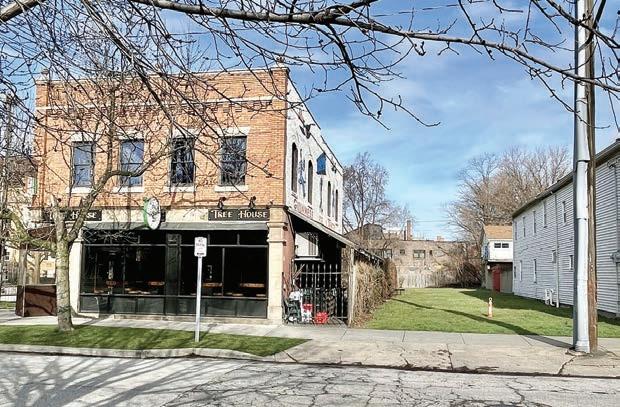
Nosan said he and his father, Rick Nosan, have known Viny for years. Brad Nosan noted that when he was an agent in the Newmark brokerage’s Cleveland o ce, he sold a Dalad-led group the former factory that it transformed into the Tinnerman Lofts, at 2048 Fulton Road in Ohio City.
Although the partners did not amplify their reasons for joining up, joint ventures have multiple bene ts for real estate developers.
One is in nancing, especially after high construction costs and higher interest rates of the last three years. Tighter underwriting requirements by lenders for loans also mean developers have to cough up more equity for borrowings. Joint ventures allow the part-
After plans to put an indoor pickleball facility in Westlake went south, Chris Haas went north.
Avon (Lake) was calling.
Haas, the president and CEO of All Pro Freight Systems Inc. of Westlake, plans to open the Cleveland Pickleball Club in September on Pin Oak Parkway in Avon Lake. e 50,000-square-foot private club will feature 16 indoor courts, two padel courts, locker rooms, a members lounge, a pro shop and a co ee/juice bar. e “state-of-theart facility” will have about 100 hours of operation each week, Haas said.
“ e sport is just going crazy and we think our timing is impeccable by opening at the end of the summer,” he said. “Having something indoors in Cleveland, it’s obviously going to be a hot spot.”
All-Pro Freight is preparing to open a 200,000-square-foot building on Pin Oak, and Haas already owns the 125,000-square-foot warehouse in front of the new one. Once Haas moves some current tenants to the new warehouse, he plans to carve out 50,000 square
feet from the existing building for the pickleball club.
“We had some … let me say challenges or hurdles with the city to put pickleball into a commercial location and they’ve been nothing but cooperative with us,” Haas said. “We got over that hurdle and so we’re pretty much ready to get going now.”
Last June, Haas announced plans to build a 12-court pickleball club in Westlake, which would have been at the site of a former Force Sports soccer facility. After negotiations with the building’s tenants broke down, he brie y considered building a freestanding 50,000-square-foot building next to his company headquarters on Crocker Road before pivoting to Avon Lake.
“We determined our investment would be signi cantly less if we put it (the club) in an existing building,” he said.
Like most areas of the country, pickleball’s popularity has exploded in Cleveland in recent years.
is month, Cleveland City Council voted to provide $100,000 with the Eurle Group LLC for an 10-court indoor pickleball facility
ners to take advantage of di erent lender relationships and parcel out tasks based on what other projects they have underway.
e previously suburbanfocused rms have upped their urban game in recent years as city housing starts pumped up with low interest rates.
Property Advisors recently jointventured on a Little Italy complex.
Dalad the past few years did a playhouse Square o ce-toapartments conversion, Worthington Square in an old Warehouse District building and Tinnerman.
Property Advisors primarily has built and operated suburban ex buildings, which o er a combination of o ce and warehouse space.
Dalad is best known as a developer of suburban o ce buildings, with holdings such as Beacon Place in Independence, although it also owns the Hoyt Block in
downtown Cleveland. e rm also has built retail and industrial buildings for its portfolio in southern suburbs.
e duo has Geis Construction Co. of Streetsboro as the designbuild contractor for the Tremont apartment project. Nosan hopes the project, so far unnamed, may get started by late summer.
Architect Brandon L. Kline, vice president of design at Geis, said the developers dialed down the height of the structure to four oors from ve “to be respectful of the neighborhood” and the height of landmark St. John Cantius Church on the other side of Professor Street.
Balconies on the building will be recessed within the structure rather than jutting out. It will have an outdoor patio, and the entrances will be “pocketed” like doorways in historic Tremont storefronts. It will have 43 parking
spaces, a one-to-one ratio for suites and car slips.
Kline outlined the designs at the March 1 meeting of the Cleveland City Planning Commission. e project received schematic approval at that session.
“We see this as a boutique property with an A-plus location in the center of Tremont,” Nosan said.
It will have 23 one-bedrooms and 20 two-bedroom suites.
Separately, Property Advisors is building an apartment complex called e Park near the Animal Protective League in Tremont. at 107-unit apartment building also is a Geis design-build project. It’s near Brevier Avenue and Lamoille Court in the Lincoln Heights section of Tremont.
Property Advisors bought the site from homebuilder and land developer Knez Homes of Concord Township. Originally Knez retained about an acre to build about 20 low-rise townhouses on the site. However, Nosan said Property Advisors recently acquired the townhouse sites from Knez when they were put on the market.
“We wanted to control our surroundings there,” Nosan said.
Bo Knez, president of Knez and its land development affiliate Triban Investments, said in a phone interview that he sold the parcels because he owned more land in the city and suburbs than he could develop “in many years.”
Neither would disclose the townhouse property sale price, and it could not be immediately located in Cuyahoga County land records.

at 12400 Crossburn Avenue in the Bellaire-Puritas neighborhood. at facility could open as early as this summer.
e Cleveland Pickleball Club will have room for 300 members, Haas said, and will include opportunities for open play, youth programs and clinics. One of Ohio’s best players, Justin Hellinger, will serve as the operating partner, helping the facility attract top players for tournaments,
Haas said. e delay with the Westlake facility allowed Haas and his partners to study other pickleball clubs, and they quickly realized they needed to focus on two things: the court surface and the lighting.
“We felt like the lighting in a lot of the facilities was not really up to par for pickleball,” he said. “We’re going to have state-of-the-art lighting.”
Although the exact membership prices are still being worked out, Haas said he will initially o er a “founding member” price, “and as we get to the (membership) numbers we’re looking at, the prices will obviously increase.”
Haas is hoping to add outdoor courts by summer 2025.
When asked why he doesn’t just add a retractable roof, Haas laughed and said, “I’ll leave that to the Browns.”
From stem cell therapies to medical device development, Beachwood’s Commerce Park is engaging vibrant companies, and the city is playing a pivotal role in fostering and accelerating business growth.
e city’s commercial hub provides a broad array of distinctive spaces, making it a nationally known magnet for area hospitals and emerging
biosciences, pharmaceuticals, biotech and biomed businesses. e growth of health service businesses and these emerging cluster industries provide Beachwood with a robust and skilled workforce, while attracting visitors to the area and strengthening the overall economic health of the city.
“Overall, the city has unparalleled amenities that are supportive to the area workforce and support a strong work-life balance,” said Beachwood Economic Development Director Catherine Bieterman. “We are

dedicated to supporting innovation within our existing companies while fostering new opportunities to grow the ecosystem around them.”
New initiatives like the city’s Linked Deposit Program o er support for lower interest rates on commercial loans. A new loan program with forgiveness based on the creation of new employment is designed to support the city’s growing cluster initiatives for companies driving product development, innovation, commercialization, technology, and research and development.
Trailhead Biosystems is one example of the many companies ourishing in the city’s business corridor.
e biotech startup pioneered the application of generating specialized human cells in drug discovery and therapeutics. e company is now focused on developing several novel types of human cells for use in research, including vascular leptomeningeal cells (VLMCs) that are essential for blood-brain barrier formation. e company plans to launch VLMCs this year as a product to advance studies across the industry.

Trailhead also initiated programs for retinal cells and hepatocytes, among other cell development projects. Chief Operating O cer Div Trivedi explained that these cells will aid in creating preclinical models and crucial tools for translating research into novel treatment strategies while also presenting therapeutic avenues.
“ e decision to relocate the company’s operations to Beachwood was driven by a combination of factors aimed at fostering both business growth and ensuring the well-being of our employees,” Trivedi said, adding that the city presented a business- and employee-friendly environment. “ e city also had a progressive approach toward the shared vision of building a biotech hub with Trailhead.”
Another thriving Commerce Park company is Innovative Medical Equipment, which moved from another neighboring community a er signi cantly outgrowing its old space. President Brad Pulver said the abundance of mixed-use buildings, plus the business corridor’s proximity to highways and the area’s major medical institutions, made the most
sense for the medical device company. IME manufacturers a medical device called ermaZone, a non-opioid pain-relieving device used to treat chronic and acute pain. e device is being used in hospitals and clinics all over the country to help patients recover from orthopedic surgeries, injuries, headaches and a variety of muscle and joint pains. rough collaboration with several prominent local physicians, the company created device attachments for the head, shoulders, back, knees, ankles and elbows.
“With the new o ce expansion, we’ll be hiring additional sales, marketing, quality & regulatory and product development resources to broaden our portfolio of devices and be positioned to treat more patients who otherwise would have turned to opioids for their pain relief,” Pulver said.
For other companies considering a move to Beachwood, Pulver said the city has a focus on strategic economic development and is supportive of local business in creative ways.

When CBIZ executives started looking for a location to build its new headquarters in 2019, they did their due diligence throughout Northeast Ohio and decided there was no place they’d rather be than Independence.
CBIZ, one of the national leaders in nancial, bene ts and insurance services, already had been in the suburb for more than 20 years. It was able to get the amenities and increased space it wanted in its new Class A o ce building on Rockside Woods Boulevard, where the company moved in November. “We couldn’t be more pleased,” says President and CEO Jerry Grisko. “It’s just been terri c.”
CBIZ, like many companies in Independence, came for its central location — at the intersection of Interstates 480 and 77 — reasonably close to downtown, the Cleveland airport and the Akron area. It served them well for decades, and hopefully will continue to do so, Grisko says.
“If you put a pin in the map and say, ‘I want to be in the most ideal location in Northeast Ohio,’ you’re going to land in Independence,” Grisko says.
MAI makes the move
MAI Capital’s lease ran out on its 42,000-square-foot o ces in downtown Cleveland in 2022. President Jim Kacic said Independence o ered reasonably priced rent and convenience for employees and clients. MAI moved into a 65,000-square-foot space and now occupies 77,000 square feet on Oak Tree Boulevard (ironically, the space formerly occupied by CBIZ).
MAI o ers a hybrid work environment like many companies a er the pandemic, and employees can work from home on Mondays and Fridays since the move to Independence. Kacic said he’s seeing employees come in on Mondays even when they don’t have to.
“Employees can eat outside on nice days,” he says. “ ey really like the setting.”
“ e move has also opened up our recruiting. It’s expanded our geography to Akron-Canton.”
City provides assistance
Independence’s location and access will always make it attractive, but
Jessica Hyser, the city’s economic development director, says it goes deeper than that. “We feel like low taxes help set us apart from other communities,” she says. “Our city council is always supportive of economic development. We think we’re a pretty good place to do business.”
So does Rich Weiser. He’s been working in Independence since 1991, rst for American Gas Co. and now for CSA Group, which bought American Gas in 1998.
“ e city is very accommodating,” says Weiser, CSA’s executive vice president for global operations. “As we’ve looked to expand and continue to grow, they’ve always been very helpful. ey’ve given us options even looking at our existing properties. ey’re willing to work with us.”
CSA’s needs are more than o ce space, Weiser notes. It was looking for some light industrial capabilities within a new 40,000-square-foot lab facility, focused on testing and certifying energy storage products, which opened in November 2022.
CSA needed to construct a building with ceilings that were at least 25 feet tall over large spaces to accommodate
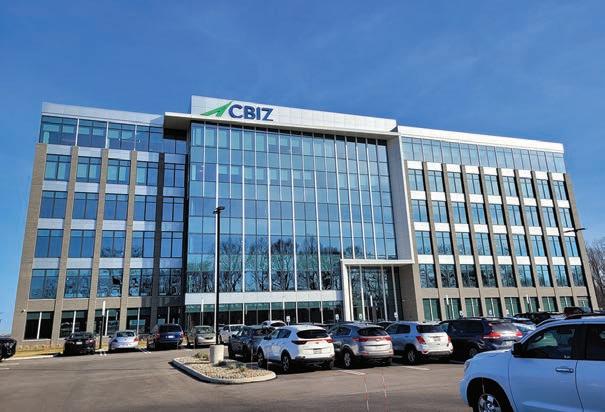
some of the industrial equipment being tested. ey also required a good shipping dock. And the city helped it all happen.
“Even when we built the building next door, the city came to us with other options, but we really like the campus feel,” Weiser says. “We feel like we have room on our property to expand for our current needs, but maybe in ve years we’ll have to look elsewhere.”
And by elsewhere, he means another spot in Independence.
“ ey’ve really been a great partner,” Weiser says.
“Independence is built for business growth,” Hyser says.










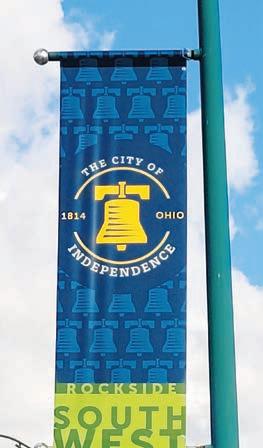





From Page 1
According to information obtained by Crain’s, the investigation into ShotStop is seemingly related to allegations of the company selling products or components that may not have been made in the U.S. or otherwise NIJ-certi ed, contrary to what the company has represented.
“In angel investing, sometimes some things wither on the vine,” said one ShotStop investor, who spoke with Crain’s con dentially amid the pending investigation. “But we didn’t expect something like this to happen.”
According to Securities and Exchange Commission lings, ShotStop has publicly reported raising at least $1.015 million in seed funding between March 2016 and October 2019.
One individual indicated that they and their partners collectively invested about $120,000 in ShotStop, but their cumulative return has been less than $20,000.
“In the early days, lots of people believed in what they were told ShotStop’s mission was, which was to save lives through an innovative ballistics panel,” said Wayne Serra, an indirect investor in ShotStop and lawyer who is representing some investor groups suing the company in Summit County. “I am very troubled by the possibility that the people who put their lives on the line every single day to protect us might
be walking around with equipment that isn’t going to protect them when they need it the most.”
ShotStop was founded in Stow in 2015 by Vall Iliev, an immigrant entrepreneur and serial businessman with a background in industrial engineering and product design.
In November 2020, Iliev said he envisioned ShotStop growing to more than 50 employees and about $150 million in revenue over the next two or three years. As of fall 2021, the business reported having just eight full-time employees, according to court documents.
ose growth projections came on the heels of ShotStop’s October 2020 hiring of Regina Larkin as director of business development, who was previously a consultant with Boston Consulting Group.
“ShotStop’s unprecedented growth, customer satisfaction and momentum a ord us the opportunity to attract best-in-class talent like Regina,” stated Iliev in a press release at the time. “As we see increased demand, we are excited to have Regina lead the important funding e orts which will add capacity, while increasing inventory and expanding our sta .”
In 2022, the company made headlines as it donated protective equipment to Ukraine amid the country’s ongoing war with Russia — something that Iliev had said was personally important to him as
someone who emigrated from communist-controlled Bulgaria during the Cold War in the mid-1970s.
Since a federal raid of the company last fall, however, ShotStop’s Stow headquarters have been emptied and vacated. Its lease there has been terminated. And its website is no longer active.
According to an email sent to investors last November, Iliev has been working to dissolve the company and wind down operations.
“On Wednesday (Oct. 18), federal and state law enforcement personnel executed a search warrant on the o ce of ShotStop relative to ShotStop’s ballistic-resistant body armor. In doing so, law enforcement con scated all of ShotStop’s body armor inventory, operational electronic systems, including all computers and electronic devices, and various other company property necessary to operate the company,” wrote Iliev in an email dated Nov. 26.
“Currently, ShotStop does not know when ShotStop’s property and inventory will be returned, but it is not anticipated the property and inventory will be returned for the foreseeable and practical future,” the email continues. “ e investigating federal and state agencies have also noti ed most branches of law enforcement of the above search warrant, which has been disseminated to many of ShotStop’s vendors and dealers.”
O cials with Homeland Security Investigations and the Ohio Attorney General’s o ce each con rmed that federal search warrants were executed at ShotStop on Oct. 18.
Representatives for those agencies said that they are unable to provide other details at this time amid the continuing investigation.
Following a request from Crain’s, however, the Ohio Attorney General’s o ce provided a notice that was sent to Ohio law enforcement agencies in conjunction with the raid. at notice states the following: “Homeland Security Investigations, with assistance from the Ohio Bureau of Criminal Investigations, recently began an investigation into ShotStop, LLC, an Ohio-based provider of ballistic body armor. During the course of the investigation, information was received that certain ShotStop Level III and IV ballistic ri e plates may not have been manufactured in the United States or NIJ certi ed, as represented. e investigation is continuing. At this time, all e orts are being made to identify the impacted plate models and dates of manufacture.”
“Out of an abundance of caution, we are making law enforcement agencies who may have purchased or are currently using ShotStop Level III and IV ballistic ri e plates aware of this potential misrepresentation, which could impact the integrity and stopping power of the plates,” the notice continues. “Additional information will be provided as it becomes

available. If your agency believes they may have any impacted plates contact faultyarmor@hsi.dhs.gov.”
In emails to investors, Iliev stated that the company has not received any orders or ful lled any sales since Oct. 18.
Spokespeople for Homeland Security Investigations and the Ohio Attorney General’s o ce have noted that the investigation into ShotStop remains ongoing.
According to a review of federal court dockets prior to publication, there have not yet been any federal charges formally led against Iliev or ShotStop.
Iliev did not respond to inquiries from Crain’s requesting comments about the raid, the related allegations or the status of ShotStop in general.
Crain’s also contacted a handful of former ShotStop employees who worked for the company in varying capacities. But most of those who were reached e ectively declined to comment or discuss their experiences with the business at this time.
In declining to comment, one former employee explicitly noted that their legal counsel has advised them to “be safe.”
“ e results of the investigation on Vall and his decisions as it relates to ShotStop will be of great interest to all,” said another former employee, declining to elaborate. “I have no other comment.”
























Although Mallie’s father hails from Cleveland, he declined to say whether the current Populousdesigned stadium should be renovated or replaced with a fancy new dome in, say, Brook Park.
“I’m not going to weigh in on that one,” he said, chuckling.
And while Populous did design Cleveland Browns Stadium, Mallie declined to say whether the Browns are a current (or future) client. But he was willing to talk by Zoom this month about overall stadium trends.
Mallie has worked on a variety of projects with a diverse group of clients, including Forest City Ratner Cos., Tishman Speyer, the Brooklyn Nets, the government of Kenya and Google. He’s also currently working with the Cleveland Cavaliers on their planned riverfront practice facility, the Cleveland Clinic Global Peak Performance Center. is interview has been edited for length and clarity.
Crain’s: So much of the discussion of what the Browns are going to do is focused on the nancing — the publicprivate investment side of things — but I wanted to get away from that for a moment, so for this conversation, we’re just going to assume that (Browns owner) Jimmy Haslam is going to open up his wallet and pay for it all. Mallie: (Laughs.) All right.
One of the things we’ve noticed is that the life cycle of stadiums is about 30 years and then teams start to look to either renovate them or replace them. Can you give us an overview of that debate, speci cally when it comes to the NFL?
It’s not a one-size- ts-all answer. It really isn’t. It’s not a formula. What we begin to nd, especially with a lot of the stadiums that were built in the 1990s, a lot of them are coming up for renovation. So it’s
a question of, what’s the status of the infrastructure? What’s the condition of the MEP (mechanical, electrical and plumbing) systems?
e building systems? e technology? First and foremost, are all of those safe? Safety comes rst. Also, are adequate facilities in place? Does the home team locker room have hot water? Does the visiting team have hot water? In many cases, that has to be looked at, rst and foremost. And this goes across all sports.
e second thing is, what kind of impact on fan experience is an ownership group and a team wanting to make for its fan base?
As the NFL is just soaring now — in terms of revenue generation — it’s a business. It’s all about merging the right amount of safety-type improvements with the right amount of fan-facing experience to help elevate your team to hopefully generate more return to then improve some more.
So it’s really case-by-case, in terms of how you evaluate the renovation-versus-new answer.
want something in between the two. It also depends on what market you are in. Can you draw for a Super Bowl? Do you have enough ancillary development to complement the building to draw people to it more than your home game schedule? All of those factors feed into the business equation in terms of what’s the right thing to do. Renovate? Build new? And to the extent you’re building new or doing a signi cant renovation, what type of architectural impact are you trying to make with the building?
The Browns said they’re looking at a menu of options (for renovations), up to maybe $1 billion. The Ravens’ renovations are around $400 million, the Superdome around $500 million and Arrowhead is around $800 million. What goes into that cost, and how much does it cost to renovate right now?
Sometimes there can be a misnomer about the cost of renovation. If you look at it on a cost-per-square-foot basis, it’s not actually that much di erent (than replacing).
“There are different approaches to every project today and whether you’re talking about building new or renovating, either can be done in incredibly creative ways.”Jonathan Mallie, Populous executive
I’m sure the iconic status of the stadium plays a part, too. For instance, Arrowhead (in Kansas City) is getting renovated rather than replaced. And they would never replace Lambeau. But Cleveland Browns Stadium doesn’t have that sort of cachet. Does that factor into the decision as well?
All ownership groups are not the same. ey have di erent goals and aspirations. Some are interested in the most iconic building in the country or the world. Some are more interested in the facility and how it functions for its team. Some
But when you do a renovation, you’re not replacing the entire building, so your total value might be a lesser spend. at doesn’t mean you can’t have high-impact moments that really drive new revenue, create fan experience and create new identity for the building without going to the expense of spending $1.5 billion-plus.
It’s about taking all those factors into consideration to determine, “What is the right path for our city? What is our community going to want? How much nostalgia does our city and community have for the stadium as it is?” Often, when there’s a discussion about a new building, people say, “What’s wrong with the current stadium?”
ere’s an outcry. People don’t


love change, and until you a ect the change and make it happen, there’s a questioning of why you’re spending the dollars, to the extent there are taxpayer dollars involved. ere’s a big sort of entanglement between the city, the community, the ownership and the government.
It looks like right now if you’re going to build a roofed or domed stadium, it’s about $2 billion versus about $1 billion or $1.5 billion for an open-air stadium. Is that about right?
I’m sure those costs are going up.
In a general sense, that seems to be some of the current trends, but it also depends on where you’re building. If you’re building in New York or L.A., it’s “X.” If you’re building in a secondtier market city, it’s “Y.” ose factors certainly come into play. ere are some projects that are published now with a roof
From Page 1
“People in Pittsburgh or Detroit will see a really deep partial eclipse and it will be interesting, but it’s not at all the same as when it’s total,” Baron said. “As soon as the moon completely blocks the face of the sun it’s like you’re looking at a sky in a sci- lm. It’s not a sky you’ve ever seen before.”
Other major cities like San Antonio, Austin, Dallas, Indianapolis and Bu alo will also experience the totality but those cities are not also hosting the NCAA women’s title game the weekend before and an MLB home opener just hours after the eclipse.
“ e world is going to be watching us starting on April 5 all the way through April 8,” David Gilbert, Destination Cleveland CEO told a group at Cleveland’s Natural History Museum on Monday, March 11.
According to estimates, 20,000-
and yeah, it’s hovering around a $2 billion number, but it’s not necessarily in the major market. e cost could be more.
About a year or two ago, some fans were saying, “Oh, why don’t you just put a roof on the current Browns stadium?” I wrote about this and, outside of tennis, I didn’t nd any evidence that anyone’s ever done this. Has there ever been a move, whether it’s Cleveland or anywhere else, to try to do that? Or is it impractical?
It’s not impractical, but the question is, “Is a roof always desirable?” ere’s a little bit of a misnomer about that out there, too. It could be the case that you want the cold weather. at’s part of your team’s DNA. You want the ferocity of the conditions in December. I think when we watched some of the football games in the playo s, snowballs
30,000 visitors are expected in downtown for the NCAA championship, culminating on Sunday, April 7, at the Rocket Mortgage FieldHouse. ose day and overnight visitors are expected to bring in “well over $25 million into the local economy,” according to initial Destination Cleveland projections.
Determining the economic impact of the eclipse will be a bit more di cult because, as Emily Lauer, vice president of public relations and communications at Destination Cleveland, explains, but initial predictions are that there could be upwards of 200,000 day-visitors to Cuyahoga County on April 8.
“It is very di cult to predict how many people will come to Cuyahoga County. ere are varying sources of potential numbers,” Lauer said. “ e nancial in ux is more dicult to predict even than the people in ux because we don’t have the data we usually have when we book a meeting, convention or an event like the Final Four when there are

being thrown, that becomes part of a team’s identity. A roof is not necessarily the right answer for everybody.
It’s funny because when the current Browns stadium was built, I don’t think anybody would have been OK with a dome. But now people are tired of freezing their butt off watching bad football in December and some people are like, “Let’s get a dome. Plus, maybe we can get Taylor Swift to come here.”
Every city is di erent. If it’s in Cleveland and that’s what everyone is saying and it’s consistent across the board, maybe that’s something worth listening to. But it really depends on the fan base over decades, in terms of what they’re used to and what they love about going to their football games.
A lot of stadiums — especially
hotel room blocks. We just don’t have those variables.”
Enticing 200,000 visitors to a notoriously cloudy city to see the solar eclipse — not to mention educating the masses on what a total solar eclipse is — does not happen without messaging.
“Our paid e orts are two-fold,” Lauer explains. “We have Road to the Eclipse marketing that we’re promoting in our usual target drive markets and have focused Eclipse promotion in the south in the larger cities in West Virginia, North Carolina, South Carolina, Tennessee, Kentucky and larger cities like Atlanta, D.C., Detroit and Chicago.”
Beyond the real economic impact for the city and county, Lauer said there are other important ancillary and long-term bene ts for Cleveland and the region.
“Every time we’ve hosted a big event the second bene t is an opportunity to change perceptions of Cleveland, as a destination and this time it is an opportunity —
urban fabric and connecting the perimeter of the stadium to the city. Or what we did with Truist Park in Atlanta. You’re creating more than just a 20-game home schedule, or in the case of baseball, 81 games. at’s a plus. But those things take time. ey don’t happen overnight. ere has to be a master plan, whether you’re renovating or you’re new. It needs to be thought of, to create this future, this vision of what could be. en build around it over time.
The argument against that, especially when it comes to an open-air stadium, is that it’s not going to be used enough to drive a lot of traf c to that location. It seems to me that a baseball stadium or a basketball arena makes more sense in a project like that since they’re getting used 100 times or more a year.
clubs where you can have the players high- ve on the way (to the eld/court). Creating those experiences that extend the game. ere’s a pregame activity, there’s a postgame activity, there’s a halftime activity, where you’re creating that type of energy. We have to think about that type of ow and circulation of people through the buildings to o er that type of experience. With in-game experiences, is it a standard seat and you’re sitting in section whatever? Or are you able to walk around the entire stadium and have multiple experiences during a game? We’ve been focused on those types of opportunities over the last couple of years.
thought of at the same level. So now what we’re doing is taking stadiums like Tottenham in London, we’re really pushing the envelope in terms of what’s o ered to the fans. ese are the future trends. Now, in terms of technology and immersive, digital content and exciting new viewing screens and interactive social network capabilities, it’s changing the game. So that’s a di erence between that period of time and now. And we need to be thinking about the future.
newer stadiums — are part of bigger retail/entertainment/ residential districts. When did that trend start, how big has it gotten and what does it look like when you add those?
We are believers that aggregating density around a stadium and using the sports facility to anchor a development is a more sustainable approach to creating a new life or energy for a city and a community. You want people to have shared moments and shared experiences that go beyond the match or a typical Sunday. Creating a live, 365, 24-7 environment. Creating those synergies with ancillary development and programming is exciting. It’s something that draws people to those locales and gives them something to do every day of the week.
If you go back to some of our baseball projects, like Camden Yards (in Baltimore) and situating that ball eld within the dense
with NASA TV broadcasting from Cleveland — for the city to really amplify its story around science and aerospace,” Lauer said.
Destination Cleveland has plans for an economic impact and visitor study to determine how many day and overnight visitors come into the county “speci cally to experience the solar eclipse here as opposed to other places,” Gilbert said, but the group’s rst pressing need is to make sure local bars and restaurants are prepared.
With the eclipse and the Guardians’ home opener happening on a Monday — a day when many restaurants are closed — the rst order of business is to convince owners to open up on their day o .
“We are opening that Monday.
e eclipse and opening day happening in the same afternoon is exciting for downtown,” Cordelia’s Andrew Watts said. “If we get
Yeah, I think you have to think about that in the case of football when it’s only X number of games a year. How can the development actually be integrated into the building? So it’s not a standalone, separate building or structure. But how can you begin to break down the stadium walls to create synergies that are multifunctional and multi-use? at takes commitment up front to that kind of future thinking.
Let’s talk a little bit about the stadiums now, especially the new ones. What do fans want and what do owners want when they build these new structures?
e way we always go about it is, “What do the fans want? What does the team want? What’s going to create a home- eld advantage?” en you look at the type of experiences within the game that you can o er to the fans and the way they can perhaps interact with the players. A lot of the renovation work that we do now is focused on upgrading GA (general admission) or GA+ or premium interiors to create accessibility between the patron and the player. You see tunnel
a nice sunny Spring day, it’ll look like a less green St. Patrick’s Day downtown and on East 4th Street with folks everywhere.”
Normally closed on Monday, April 8, will mark both the rst Monday and the rst weekday afternoon service for the restaurant, but Watts said he could not pass up being open for the two events that will not happen simultaneously again in a lifetime.
“We can’t predict what this will look like but we will be ready to be busy,” Watts said. “We anticipate downtown will be busting at the seams with crowds.”
ere is concern that visitor hype could be overblown and restaurants and bars will be left with excess food and booze, much like during the 2016 Republican National Convention when locals ed the city and visitors stayed close to their respective hotels.
See ECLIPSE on next page
Fifty years ago, stadiums were about getting as many fans in as possible. Now it seems like the capacity is shrinking, the amenities are getting better. Now you’re trying to maximize the exclusive experiences.
Exactly. ere’s an inverse relationship. As technology improves and it’s far much more amazing to watch on your phone or your home, then your interest in being in the stadium decreases. So, to increase the energy in the stadium, there’s a bit of a reduction in capacity so there’s no open seats, but you also have to enhance the experience for the fans so they want to be there. So those are kind of competing forces, but if you do it right, there’s a sweet spot in terms of what your total capacity is.
Let’s talk a little bit about Cleveland Browns Stadium, which was a Populous project. It was kind of a rush job — and that’s not a shot at Populous, because people wanted football fast and it was on a budget. But can you speak to how the stadium is viewed (nationally), and what sort of things it needs if it’s going to be renovated?
Well, speaking in terms of any stadium built in that time period, the idea of exclusive, premium amenities or GA+ amenities or even GA amenities, was not
Just as they couldn’t anticipate 30 years ago what stadiums would look like in the future, I’m sure you guys are in the same position now where you can only do so much in terms of anticipating what a fan will want in 10, 15, 20 years.
ere are di erent approaches to every project today and whether you’re talking about building new or renovating, either can be done in incredibly creative ways. We need to think about buildings being economically sustainable, but sustainable in general relative to our climate and so forth. e more we can focus our ideas on what will create incredible fan experiences, draw them to the game, create density around the stadium in general and think about the future, that’s where our heads at, at this point.
Anything else you wanted to mention?
Well, if you look at what happened at the Super Bowl and everything that happened over the last year with Taylor Swift (cheering on Chiefs tight end Travis Kelce), that was a generational-shift moment with celebrity and entertainment merging with the NFL. Logically, we would think that starts to create synergy between the Sunday game as well as a concert. Is there a pregame concert? Does it create more and more energy around the stadium? Now you’re starting to see what can happen when you’re drawing in this many more fans.

Environmental Design Group
From previous page
 Unrue
Unrue
Environmental Design Group, a leader in planning, design, engineering, and construction-related services since 1984, announces two leadership promotions. Lu Ann Unrue has been promoted from the role of Chief Strategy Of cer to President and Chief Operating Of cer. For more than three decades Lu Ann has played an integral role in the evolution of EDG. In an industry where female leadership is underrepresented, Lu Ann has set an inspiring example to others.

Groll
In a concurrent promotion, Dwayne Groll, PE, will transition to the role of Chief Executive Of cer and Chairman of the Board. Dwayne’s commitment to the organization since 1992 sets the stage for the next iteration of cultural and strategic growth serving EDG’s clients and communities.

The MetroHealth System
Schauer Group, a risk management and insurance advisory rm, welcomes Alfred Perry III to its Canton of ce as a client executive. Alfred previously worked as a risk and insurance analyst at Parker Hanni n, and his career also includes experience in account management with USI and AssuredPartners. He holds a Bachelor of Science in insurance studies from Kent State University.

Kastner Westman & Wilkins


“ e prevailing thought, as near as I can tell, is that folks will be gearing up for (the eclipseopening day combo) like it is a busy weekend,” said Sean Cathcart, Northeast Ohio sales representative for Skurnik Wines & Spirits. “I don’t think the solar eclipse crowd is necessarily going to be a late-night bar crowd.”
ose prices are a far cry from the $55 to $150 a night rate smaller places in Ohio City and Tremont will revert to the weekend after the Final Four-eclipse-Guardians’ opener con uence in April.

The MetroHealth System is pleased to announce Rakhshanda Rahman, MBBS, MD, FCPS, FRCS (Ed & Glasg), FACS, as Director of the Cancer Institute. Dr. Rahman joins MetroHealth from Texas Tech University Health Sciences Center in Lubbock, Texas, where she served as Medical Director of the UMC Cancer Center, Director of Breast Center of Excellence and Vice Chair of Cancer Research and Development. She is nationally recognized for her clinical practice and translational research in the eld of cryoablation for breast cancer. Dr. Rahman is also the recipient of several awards and honors, including the Executive Leadership in Academic Medicine (ELAM) and Professional Breast Health Champion. Her latest publication is titled Leadership Deconstructed.

The labor and employment rm welcomed back Catherine Gambill as an Associate Attorney. She initially joined K|W|W in 2015 and has impressive experience in both civil litigation (including employment law) and workers’ compensation. Gambill will represent K|W|W’s clients across a range of labor and employment matters. She spent the past nearly three years as a District Hearing Of cer for the Ohio Industrial Commission. She earned her J.D. from The Ohio State University Moritz College of Law.

Wright Tool
Wright announces
Gregg Futey as its new assistant vice president. In his role, Futey will be a member of the leadership team and have a role in business development, nancial administration and marketing. He brings 12 years of manufacturing experience to the role. Futey holds a bachelor’s degree in management and organizational leadership from Miami of Ohio University and an Executive MBA from Katz Graduate School of Business at University of Pittsburgh.

The American Heart Association is proud to announce the regional promotions of Dawn Clark to Associate Executive VP, Eastern States Region and Valerie Hillow Gates to Senior VP, Midwest Region. Clark, with over two decades of service, will drive positive change and growth among nearly 300 employees in the Eastern region. Having previously served as Senior VP, Midwest, she continues to set a powerful example for the entire organization. As the new SVP, Hillow Gates now oversees a team of more than 50 individuals across Cleveland, Columbus, Cincinnati and Indianapolis. With over 20 years of dedicated service within the organization, she has excelled in various roles, most recently as Executive Director of Greater Cleveland.


Ohio City restaurateur Sam McNulty is undeterred. He plans to have multiple restaurants and breweries open on Monday when they are normally closed. McNulty, a consummate optimist, began his eclipse day plans early and was rst to market last summer with a “Totality” hazy IPA at his Market Garden restaurant and brewery in anticipation of the April eclipse.
“When we marked the calendar, back in 2017, for this date I had no idea Opening Day would be on the same day and had no idea the women’s NCAA tournament would be here too but those just add to the impact,” he said. His team is also working on some eclipse theme cocktails and specials for the big day and has already taken reservations for visitors from as far away as Ireland and Zimbabwe.
“All due respect to the Great Lake Science Center and the Natural History Museum, but those are more family-focused events and I’m sure they’re going to be awesome, but I think Ohio City is the total Solar Eclipse headquarters. ere’s a lot of outdoor space and it has the real Cleveland experience,” McNulty said.
Private rentals are not the only ones taking advantage of the opportunity. According to a Tripadvisor tool comparing hotel prices day-to-day for places around Cleveland, the Arcade Hyatt went from an average price of around $200 a night (depending on the room and the day of the week) to more than $900 on ursday, April 4, and $951 a night on Saturday, April 6. e rate is nearly $500 on Monday, April 8, before plunging to $180 the next day.
e price surge is less steep but with similar per-room rates for the Ritz-Carlton downtown. On ursday, April 4, prices spike to just under $950. e Cleveland Marriott Downtown at Key Tower room price is hovering around $900 beginning Tuesday, April 2, through Sunday April 7, only to return to the $200-plus range the following week.
“In 2023, downtown hotel occupancy on April 7 and 8 was at 69% occupied and 65% occupied, respectively, with average daily rate at around $100 and $186 — and those numbers are great for that time of year,” Lauer said. “In 2022, for those nights, we were at 41% and 48%, and April 2020 was our lowest month of occupancy ever.”
As of March 12, there are no rooms available in any Hyattowned hotel which includes the Regency in the Arcade and locations in Westlake, Legacy Village and Canton for the nights of April 5-8.

If the surge prices for local hotel chains, Airbnb and Vrbo are any indicator, Cleveland, in particular, is having no problem bringing in visitors for the eventful long weekend.
Most Airbnb and Vrbo o erings in or near downtown Cleveland are o ering four-night stay packages at well above the normal daily rates.

The American Heart Association, Greater Cleveland is thrilled to announce Shelley Webber as the new Executive Director and Molly Palmer as the new Vice President, Development. With more than 14 years of nonpro t experience, Webber will serve as staff lead for the Board of Directors and drive strategic direction to a team responsible for the execution of fundraising revenue, communications and equitable health impact goals in the Greater Cleveland area. Palmer, who joined the Association in 2010, will now oversee the management of a dynamic fundraising team, as well as collaborate with corporate and community leaders to maximize ef ciency and effectiveness of fundraising efforts.

According to a late February press release from Airbnb, there has been a 1,000% increase in searches for places to rent along the solar eclipse path from April 5-8, 2024, compared to the same time period in 2023.
Cleveland — along with Indianapolis, Waco, Texas, and Burlington, Vermont — is one of the mostsearched cities along the eclipse totality path, according to Airbnb.
Vrbo partnered with Expedia to o er an app feature to help any travelers looking for lastminute places to stay, showing a map with all available hotels and private vacation rentals along the solar eclipse path.
ere are still some rentals available in and around Cleveland, but visitors should be prepared to pay anywhere from, on average, $300 to $600 a night for small apartments and $1,200 to more than $2,000 a night for a larger house. And, in may cases, the bookings require a minimum four-night stay.
Hilton Hotel and Resorts in downtown Cleveland have almost no availability and available rooms at the Hilton Beachwood for those dates are running nearly $620 a night. at comes out to more than $2,000, with tax, for the Final Four-eclipse days. A week later, that same room runs about $265 a night and would cost less than $1,000 for four nights.
e Marriott chain hotels — including the Renaissance Cleveland Hotel, the Ritz-Carlton Cleveland, Cleveland Marriott Downtown at Key Tower, the Westin Cleveland Downtown, the Metropolitan at the 9 and Aloft Cleveland Downtown — are all sold out for April 5-8.
e Aloft in Beachwood and SpringHill Suites in Independence have rooms, but those rooms will cost you more than $400 a night. Only the Courtyard Cleveland Airport has rooms going for under $400 a night, all for rooms that will cost $149 to $200 a night a week later.
A one king-bed studio at the Residence Inn Cleveland Avon is $412 a night and $1,237 total for four nights and is “prepay, nonrefundable, non-changeable” according to the website.
ere is good news for one lucky downtown Cleveland visitor who has some extra cash to burn: at publishing time, there is a room at the Ritz Carlton from April 4 to April 7 for $4,538 a night in the hotel’s prestigious Presidential Suite.






























CrainsCleveland.com
President and CEO KC Crain
Group publisher Jim Kirk (312) 397-5503 or jkirk@crain.com
Associate publisher Amy Ann Stoessel (216) 771-5155 or astoessel@crain.com
Interim editor Ann Dwyer (312) 649-5349 or adwyer@crain.com
Director of audience and engagement Elizabeth
Couch, (313) 446-0419 or elizabeth.couch@crain.com
Director of visual media Stephanie Swearngin
Creative director Thomas J. Linden
Managing editor Marcus Gilmer 216-771-5169 or marcus.gilmer@crain.com
Special projects editor Scott Suttell
Assistant managing editor John Kappes
Projects editor Stacy Sominski
Web editor Damon Sims
Associate creative director Karen Freese Zane
Digital design editor Jason McGregor
Art directors
Kayla Byler, Carolyn McClain, Joanna Metzger Cartoonist Rich Williams
Notables coordinator Ashley Maahs
REPORTERS
Paige Bennett, Health Care, Nonpro ts, Philanthropy (216) 771-5479 or paige.bennett@crain.com
Stan Bullard Real estate/construction (216) 771-5228 or sbullard@crain.com
Jack Grieve, audience engagement jack.grieve@crain.com
Jeremy Nobile, Finance/legal/beer/cannabis (216) 771-5255 or jnobile@crain.com
Kim Palmer, Government (216) 771-5384 or kpalmer@crain.com
Joe Scalzo, Sports business (216) 771-5256 or joe.scalzo@crain.com
Dan Shingler, Energy/steel/auto/Akron (216) 771-5290 or dshingler@crain.com
ADVERTISING
Senior vice president of sales Susan Jacobs (312) 649-5492 or susan.jacobs@crain.com
Sales manager Mara Broderick (216) 771-5158 or mara.broderick@crain.com
Events manager Missy Chambless (216) 771-5388 or missy.chambless@crain.com
Sales and marketing coordinator Shannon Smith
Account executives
Kaylie Moran, Ed Sivillo, Melissa Streicher
People on the Move manager Debora Stein (917) 226-5470, dstein@crain.com
Classi ed sales Suzanne Janik (313) 446-0455 or sjanik@crain.com
Inside sales Tawni Sharp
CRAIN’S CONTENT STUDIO
Senior director of Crain’s Content Studio Kristin Bull, (313) 446-1608 or kbull@crain.com
PRODUCTION
Vice president, product Kevin Skaggs
Product manager Tim Simpson
Media services manager Nicole Spell
Pre-press and digital production Craig L. Mackey
CUSTOMER SERVICE (877) 824-9373 or customerservice@crainscleveland.com
Reprints Laura Picariello (732) 723-0569 or lpicariello@crain.com
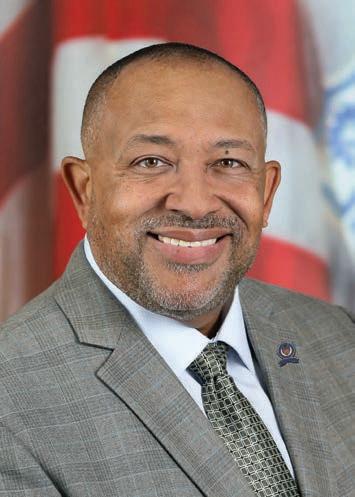
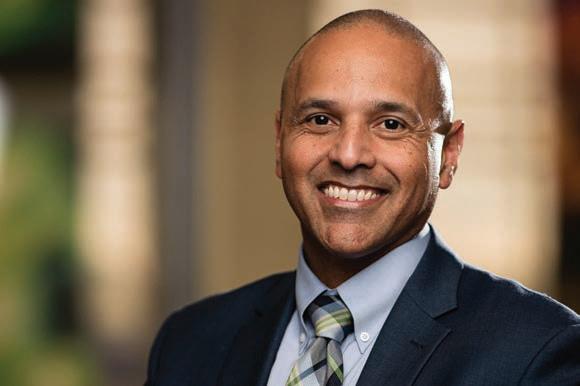

DIRECTOR OF PORT CONTROL FOR CITY OF CLEVELAND
Clevland Hopkins International Burke Lakefront Airport
PRESIDENT & CEO
Akron-Canton Airport
 Bryan Francis
Renato “Ren” Camacho
Bryan Francis
Renato “Ren” Camacho